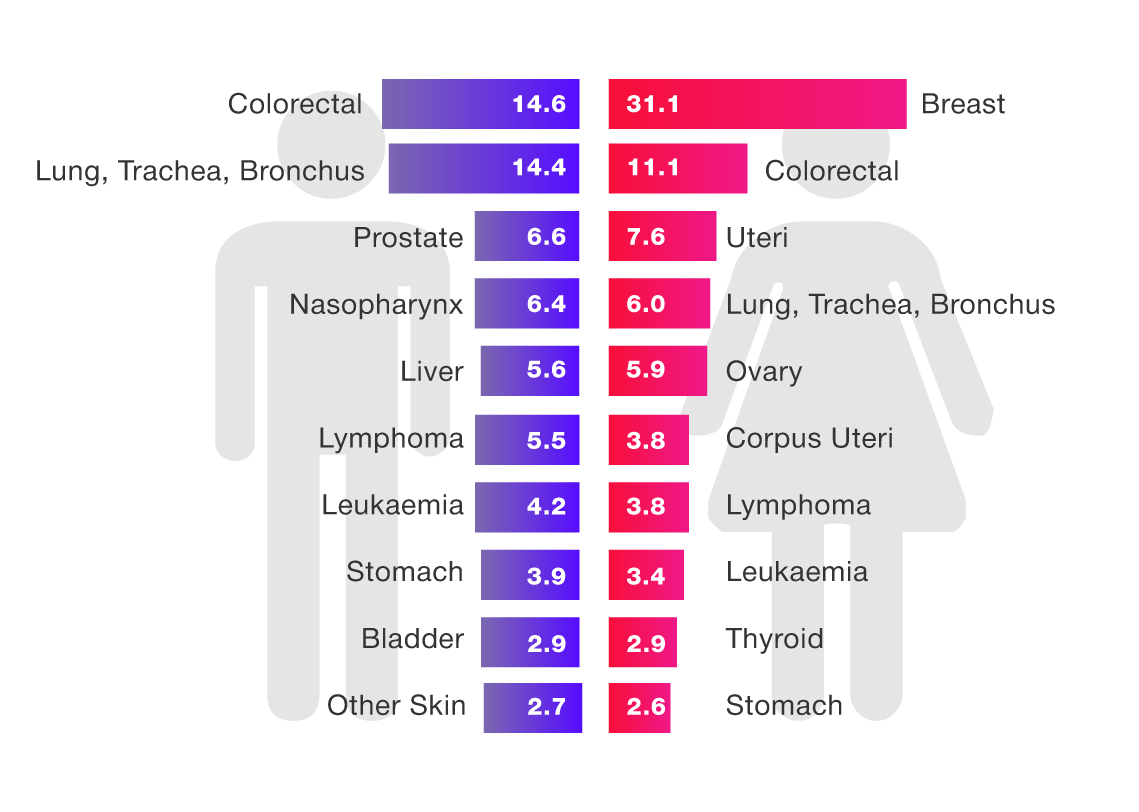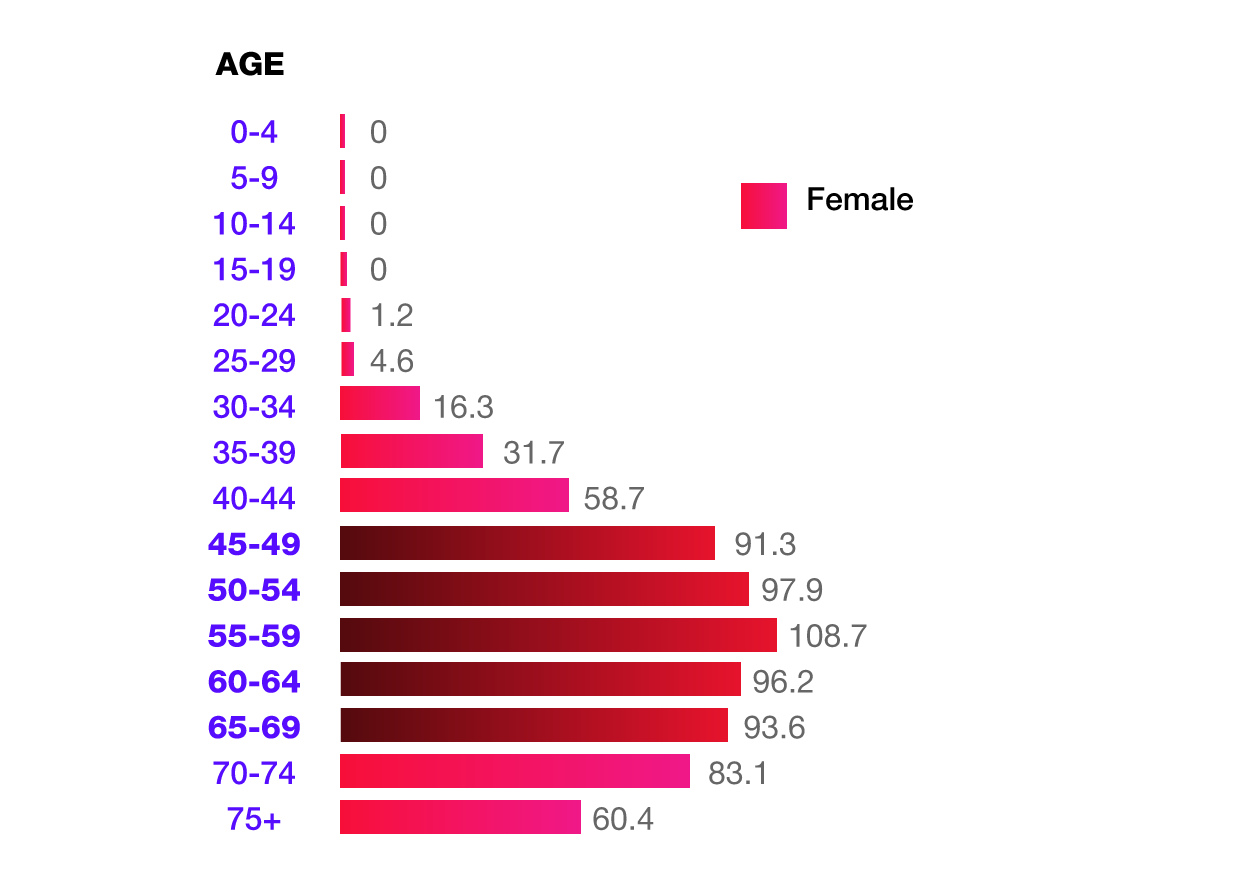Breast Cancer
What is Breast Cancer?
Breast cancer starts in the breast tissue, most commonly in the cells that line the milk ducts of the breast. Some cancers start in the glands that make breast milk. Other types of breast cancer are less common. Many types of breast cancer cause a lump in the breast, but not all do. Check out the signs and symptoms section to find out more.
How Common is Breast Cancer?
Breast cancer is the most common cancer in females in Malaysia. It accounts for 32.1% of cancers in females and less than 1% in males.
According to the Malaysian National Cancer Registry Report (2007 – 2011), 31.1 breast cancer cases were diagnosed per 100,000 population. The incidence was highest in Chinese (1 in 22) followed by Indian (1 in 24) and Malay (1 in 35). Breast Cancer can occur at any age.
However, the risk of developing it increases with age. In Malaysia, women aged 40 years and above are at moderate risk of developing breast cancer. Women aged 50 years and above are most often affected.
INCIDENCE RATE (ASR) FOR TEN MOST COMMON CANCER BY SEX
AGE STANDARDIZED RATE (WORLD) PER 100,000 POPULATION


What are the Survival Rates?
The earlier breast cancer is found and treated, the better the chances are for it to be cured. Did you know, 9 out of 10 women can survive Breast Cancer if it is found and treated early?
Currently, breast cancer is often detected at a late stage and chances of survival are reduced.
Therefore, watch out for the signs and symptoms and get it checked as soon as you notice any abnormal changes.
If you notice any of these signs or symptoms, see your doctor immediately. It could be nothing but it is better to play it safe. Always check with your doctor.
Signs & Symptoms
Breast Self-Examination
Follow this guide to check your breasts for any abnormal changes.
If you notice any of the described warning signs for breast cancer, see your doctor immediately.
Remember, Breast Cancer can be cured if it is found and treated early.
Who At Risk?
The risk of breast cancer increases with age. Especially for those who are aged 40 years and above. Other factors include:
- Having a history of breast cancer
- Having a close relative with breast cancer
- Lifestyle factors: being overweight, inactive, drinking alcohol (more than 1 unit per day)
- Using Hormone Replacement Therapy
- Having children later on in life (having first child at 30 years or older)
- Starting your periods at an early age (12 years or younger)
- Having a late menopause (55 years or older)
How can you reduce your risk?
Screening & Diagnosis

Through screening, cancer can be detected before you experience any symptoms. Finding cancers early means that treatment is likely to work best and your chances to survive are increased. In Malaysia, the following breast cancer screening guidelines apply:
- At any age, if you experience any of the described symptoms, see your doctor urgently to get checked.
- If you are aged 50 years or above, go for a breast cancer screening (mammogram) every 2 years. The aim of a mammogram is to detect breast cancer at an early stage when treatment is more likely to be effective.
There are the two main tests that are commonly used to screen for breast cancer.
- Clinical Breast Examination (CBE): This is a physical examination of the breasts and the underarm area by a trained health care professional. During CBE, health care professionals will look and feel for any abnormal changes.
- Mammogram: This test is used to detect breast cancer early. It is used for women who experience no symptoms as well as women who notice symptoms and want to get it checked out. During a Mammogram, X-Rays of both breasts are taken and even small changes, that are not visible, can be detected.
Treatment
There are several treatment options for breast cancer. Speak to your doctor to find out the best treatment option for you.
A list of all government hospitals in Malaysia can be found here.
Further information about Colorectal Cancer can be found under Resources.
Male support
Breast Cancer does not only concern women who develop it but also the men in their lives.
For many women, it is important to have the support of their husbands and partners to undergo breast cancer screening and to undergo treatment if necessary.
Males should encourage their wives to undergo screening and give them the psychological support needed if treatment is necessary.

